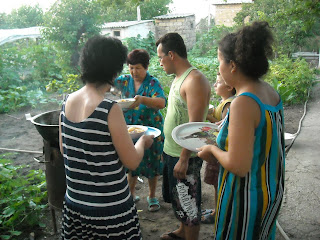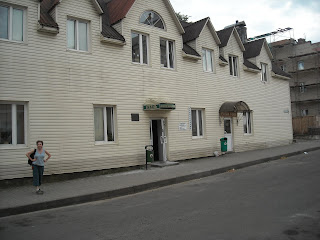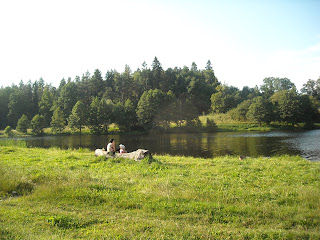








Tuesday morning at the library, last day of the summer. Tomorrow on September 1st school starts all across Ukraine—same date for all schools, universities, colleges, etc.—so it is quite the day. The buses will be filled in the morning with children dressed in their finest—girls in dresses with big bows in their hair and boys in suits and ties—all carrying flowers to give to their teachers. I don’t know what university students do, but I probably there isn’t that elaborate of a ritual. It will be interesting to hear Serdar’s tales from his first day at the Medical University where he is embarking on a six to eight year course to become either a dentist or a doctor. All the students take the same classes for the first two or three years and then separate after that. He wanted to be a doctor but was admitted to the dental program, but if he does well enough, can switch to the doctor program eventually. Though, curiously, dentistry is a better paid profession in Ukraine. Someone said it is because all of those gold teeth you see everywhere. I think it is more the fact that everyone consumes so much sugar!
Feeling kind of at loose ends today. Earlier I said goodbye to Elizabeth, the Fulbright student in Simferopol that I got to know this year. She is heading back to the States to enroll at the University of Chicago. Supposedly a new Fulbright student will be coming soon, so I look forward getting to know her too. Reminds me a bit of my wilderness guiding life when so many people passed through my life for brief periods of time. I am beginning to feel like a fixture here.
I have been nursing a bad cold this past week, but earlier in the week I had asked Serdar if he wanted to go hiking on Saturday, and Friday we started trying to figure out where to go. So when Saturday came and I was still feeling lousy, I just told myself, “take some drugs and go anyways…you won’t regret it.” And how right I was. What a wonderful, wonderful day. A day that made me fall in love with Crimea all over again. These last few months have been so full of showing visitors around—something I have loved so I am not complaining—but in the summer months that has meant braving the crowds of tourists. When I was walking along the boardwalk in Yalta last weekend with my PCV friend Fran, I kept looking up into the mountains, longing to be in that wilderness. And Saturday I got my chance.
After studying the map, we decided to hike up to Demerdji Mountain. The road to the coast that I have taken many times on the bus goes over a pass through the mountains. You can get off the bus there and just start hiking. Or so it looked like on the maps. And unlike some thwarted excursions earlier in my life, this time the map was right. The three of us—Serdar and I and Adrianne, the other PCV in Simferopol—bought a ticket to Alushta, a town on the coast, but got off the bus at “pereval” (pass), about thirty minutes outside of Alushta. We asked some of the local roadside vendors for directions, and then started walking an old road/trail through the forests that lead up to the mountain ridges. We hiked for some time, taking whatever trail presented itself going in the right direction (up), and eventually encountered two men with backpacks. They were heading out for a weekend on the mountain, exploring a cave they knew about and camping for a few days. They were very experienced wilderness travelers and wanted to show us the cave. So we followed them up the mountainside with beautiful views of the coast and surrounding mountains--including Chatir Dag, the mountain I see on my daily walks at home—spreading out around us. I was so happy to be there, to know that this wilderness existed in Crimea, to know that I could come back with some camping gear and spend days exploring this vast,unpeopled landscape.
We came to the cave, hidden in trees on the side of the mountain. A large opening extended deep into the mountainside, the cold air engulfing us as we neared the entrance. At the back of the cave, there was a vertical opening leading down to another level. Our guides' plan was to repel down and explore that part of the cave. We left them at the entrance, suiting up and sipping some tea for warmth, and headed back out on the trail and on up to the mountain top, which was a vast open area that stretched into the distant horizon. We knew there were some fascinating rock formations on the mountain, and also some ruins, but we also knew that we would need more than one day to get to them. So we sat for awhile in the sun near one of the rock carons on top, eating cheese and bread and apples, talking about our countries, especially about what is wrong in America.
Serdar pelted us with questions about why Americans do the things they do. Some of his questions were very hard to answer, questions I also ask myself about what has gone wrong in my country. And my answers are few, though many times I come back to the media and their manipulation of our minds and hearts. But, of course, we let them do that. How has our ability to educate ourselves as thinking, discerning people failed so miserably? Sometimes Serdar’s questions are a matter of curiosity, as they seemed to be that day. But other times, like last night, I am taken off guard by his anger at my country, an anger that is justified in the face of all that America has done in the world. And sometimes he forgets, as we all tend to do, especially if we are passionate 16-year-olds, that citizens of a country aren’t the same as the government of a country, no matter how “democratic” a country it is. And I feel his anger towards me as representing America. But then it is over as quickly as it seems to come, and we sit down with Neshet to play cards and he turns towards me with his lovely smile, and we are friends again. But a lesson it is in how America is perceived—and sometimes hated—in the world.
But back to our mountaintop, where we sit and survey the surrounding world, making plans to return for a weekend of camping and exploring. My thoughts wander off to how old I am, how long will I be able to keep up with my friends who are 45, 35, 25 years younger than me, and how incredibly lucky and grateful I am that I am able do that now. One of the backpackers, who was not a spring chicken himself with his grey hair, but definitely younger than me, decided I was a babushka (grandmother in Russian but a word for any elderly woman) and needed “assisting.” So he lent me one of his hiking poles and stayed behind me going up steep inclines to make sure I wasn’t getting too winded. I wanted to tell him some of my history and that I really didn’t need his assistance, but I didn’t have the language for it, and besides, I liked having that hiking pole.
Got home kind of late that night, and the next day laid around trying to recuperate from my intensified cold, but oh, it was so worth all of it. My heart was, and is, filled once again with a great love for this land that is becoming my home.









































